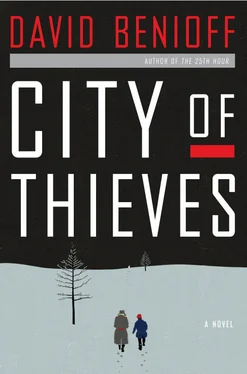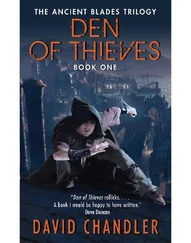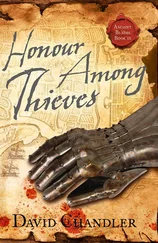“You want us to find eggs?”
“A dozen,” he said. “She only needs ten, but I figure, one might break, a couple might be rotten.” He saw our confusion and he smiled his wonderful smile, gripping our shoulders hard enough to make me stand straighter. “My men say there are no eggs in Leningrad, but I believe there is everything in Leningrad, even now, and I just need the right fellows to find it. A pair of thieves.”
“We’re not thieves,” said Kolya, very righteous, staring into the colonel’s eyes. I wanted to punch him. By all rights we should have been dead and frozen, piled onto a sledge with the rest of the day’s corpses. We had our reprieve. Our lives had been returned in exchange for a simple task. A strange task, perhaps, but simple enough. And now he was going to ruin it—he was asking for his bullet, which was bad, but he was asking for my bullet, too, which was far worse.
“You’re not thieves? You abandoned your unit—no, no, shut up, don’t say anything. You abandoned your unit and the moment you did that you forfeited your rights as a soldier in the Red Army— your right to carry your rifle, to wear that coat, those boots. You’re a thief. And you, Big Nose, you looted a corpse. It was a German corpse so it doesn’t personally offend me, but looting is theft. Let’s not play games. You’re both thieves. Bad thieves, that’s true, incompetent thieves, absolutely, but you’re in luck. The good thieves haven’t been caught.”
He turned and walked back toward the house. Kolya and I lingered, watching the colonel’s daughter, her fox fur flashing in the sun. She must have seen us by now, but she never acknowledged us, never glanced our way. We were two of her father’s lackeys and therefore entirely boring. We watched her as long as we could, trying to etch the image into our brains for future masturbation, until the colonel barked at us and we hurried after him.
“You have your ration cards?” he asked, taking long strides, his respite finished, ready again for the long day’s work. “Hand them over.”
I kept mine pinned to the inside pocket of my coat. I unpinned it and saw Kolya pull his from his folded sock. The colonel took them from us.
“You bring me the eggs by sunrise Thursday, you get them back. You don’t, well, you’ve got all of January to eat snow, and there won’t be any cards waiting for you in February, either. That’s assuming one of my men doesn’t find you and kill you before then, and my men are very good at that.”
“They just can’t find eggs,” said Kolya.
The colonel smiled. “I like you, boy. You won’t live a long life, but I like you.”
We stepped inside the sunroom. The colonel sat down at his desk and stared at the black telephone. He raised his eyebrows, remembering something, opened the desk drawer, and pulled out a folded letter. He held it out for Kolya.
“That’s a curfew waiver for the two of you. Anyone gives you trouble, show them that, you’ll be on your way. And here, this, too….”
He pulled four 100-ruble notes from his wallet and gave them to Kolya, who glanced at the letter and the rubles and slipped them into his pocket.
“That would have bought me a thousand eggs in June,” said the colonel.
“And it will again next June,” said Kolya. “Fritz won’t last the winter.”
“With soldiers like you,” said the colonel, “we’ll be paying for eggs with deutsche marks soon.”
Kolya opened his mouth to defend himself, but the colonel shook his head.
“You understand this is a gift? You bring me a dozen eggs by Thursday, I give you your lives back. You understand the rareness of this gift?”
“What day is today?”
“Today is Saturday. You deserted your unit on a Friday. When the sun rises tomorrow it is Sunday. Can you keep track from this point forward? Yes? Good.”
Borya returned with four slices of toast on a blue plate. The toast had been slathered with something oily, lard maybe, glistening and fatty and luscious. Another aide stepped into the sunroom behind him, carrying two cups of steaming tea. I waited for a third aide carrying bowls of fish soup, but he never came.
“Eat quick, boys,” said the colonel. “You’ve got a lot of walking to do.”
“Big Nose. I like that. Who was your father, Big Nose?”
“You wouldn’t know him.”
“If he was a published poet, I know him.”
“Just leave it alone.”
“You’re a moody one, aren’t you?”
We were crossing the Kamennoostrovsky Bridge again, this time on foot. Kolya stopped at the midpoint, gloved hands on the balustrade, looking down the river toward the Dolgorukov mansion. The colonel’s daughter no longer skated her figures, but Kolya watched for a moment anyway, hoping for an encore.
“She smiled at me,” he said.
“She didn’t smile at you. What are you talking about? She didn’t even look at us.”
“Perhaps you’re jealous, my friend, but she definitely gave me a smile. I think I’ve seen her before, at the university. I have a reputation.”
“As a deserter?”
Kolya turned away from the balustrade and glared at me. “I’ll knock your teeth out if you call me a deserter again.”
“I’ll shove my knife in your eye if you try it.”
Kolya considered this and turned back to his river view.
“I’d get to you before you could pull the knife. I’m very quick when I need to be.”
I thought about pulling the knife now, just to prove him wrong, but he didn’t seem angry anymore and I wanted to keep moving.
We crossed the bridge, back to the mainland, and headed south on Pesochnaya, the river to our right, the rusted rails of the Finland line to the left. No trains had run since September, when the Germans encircled the city and cut the tracks of every line—Finland, Moscow, Vitebsk, Warsaw, Baltic—all severed and useless. The city’s only connection now with the rest of Russia was by air, and few planes could make it through the Luftwaffe patrols.
“We could run for it, of course. Tough without ration cards, though.” He considered the problem. “The NKVD boys don’t worry me much. In the army they say the police can’t find pussy in a whorehouse. But not having ration cards… tricky.”
“We have to find the eggs,” I told him. We were walking in the sunlight and breathing the air because of the colonel’s command; if the payment for this reprieve was a dozen eggs, we would find a dozen fucking eggs. There was no room for negotiation or maneuvering.
“Finding the eggs is the best outcome, I agree. Doesn’t mean I can’t consider my options. Maybe there are no eggs in the city. Then what? You still have family in Piter?”
“No.”
“Me neither. That’s one good thing. Only have to worry about our own skins.”
Signs were posted on the walls of fire-gutted warehouses: HAVE YOU SIGNED UP YET FOR THE PEOPLE’S VOLUNTEERS? There were no residential buildings in this area and the street was empty, no one else walking beneath the colorless sky. We could have been the last two survivors of the war, the last two defenders of the city, with only my stolen knife and Kolya’s purportedly quick fists to fight off the Fascists.
“The Haymarket’s our best chance,” said Kolya. “I was there a few months ago. They still had butter and cheese, a little caviar, maybe.”
“So how come the colonel’s men couldn’t find any eggs?”
“It’s the black market. Half that stuff is stolen. You’ve got people trading their ration cards, all sorts of lawbreaking. They’re not going to sell to anyone in a uniform. Especially not an NKVD uniform.”
It seemed like a reasonable argument. Kolya whistled some tuneless song of his own invention and we walked south toward the Haymarket. Things were looking up. Execution was not imminent. I had more food in my stomach than I’d had for weeks, and the strong black tea provided an extra spark. My legs felt strong enough to propel me wherever I needed to go. Someone, somewhere, had a dozen eggs, and we’d find them eventually. In the meantime I enjoyed a vivid fantasy of the colonel’s daughter skating naked on the Neva, her pale ass shining in the sun.
Читать дальше












